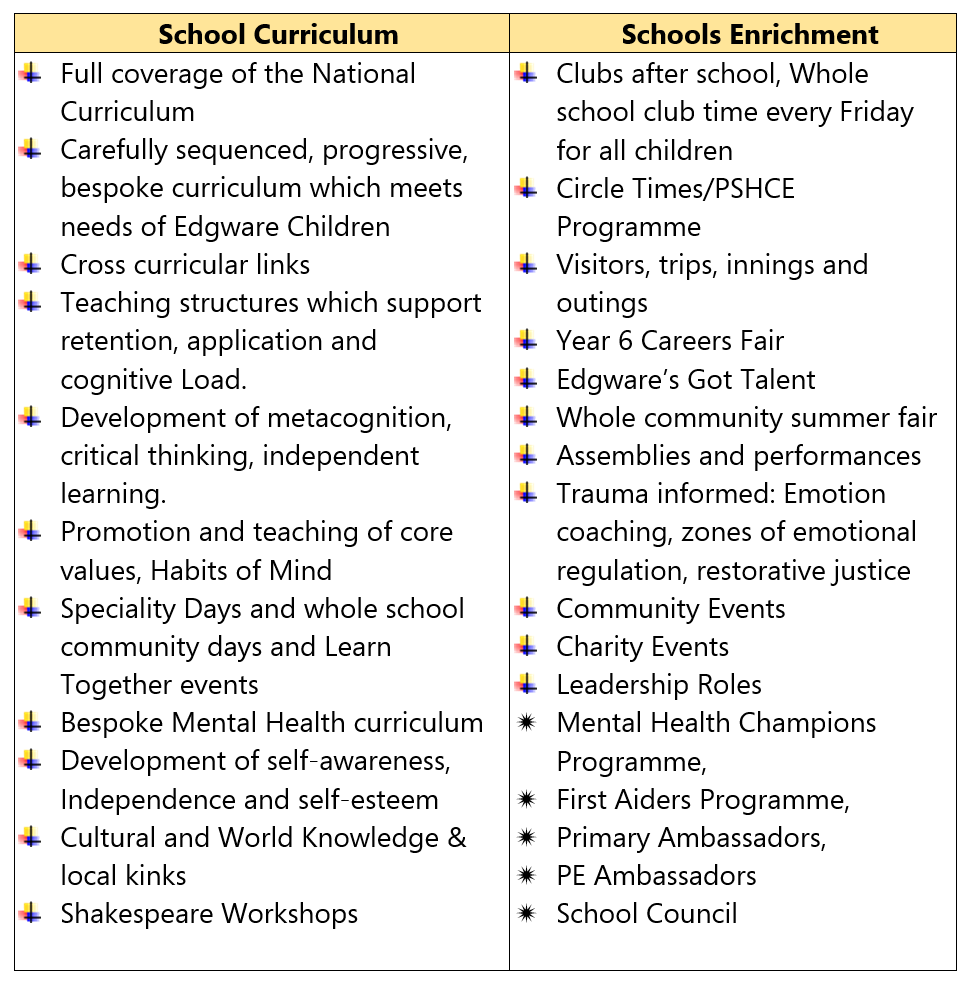Curriculum Statement & Planning Documents
CURRICULUM INTENT
At Edgware Primary we believe in lifelong learning and the notion that learning should be enjoyable, within a nurturing and inclusive environment. We are accredited as a Thinking School - and thinking is at the very heart of our curriculum. We place emphasis on developing critical thinkers, independent and self-regulated learners. We want our pupils to have the confidence and skills to ask questions and find answers independently. Through our engaging, bespoke and balanced curriculum, we encourage reflective and creative thinking and inspire our children to bring their own experiences and ideas. We equip our pupils with the broad skills, rich knowledge and understanding necessary to develop as resilient, 'whole children'. We give all pupils, including children that are disadvantaged and with SEND, the knowledge and cultural capital they need to succeed. We ensure that we embrace the cultural diversity of our families and this is reflected in our curriculum. In the process of teaching diversity and promoting equality and inclusion, we help pupils to develop a multitude of valuable attitudes and transferable skills such as acceptance and tolerance.
We prepare children for the next stage of their life and life after school. As Art Costa, an American Educator says "Not just a life of tests, but for the tests of life".
Through high expectations and and a consistent approach, we tailor teaching to meet individual needs, ensuring that children make consistently good or better progress.
We develop three key areas:
Metacognition: Monitoring and controlling what's in your head/thinking.
Self-Regulation: Monitoring how you react with your environment; relationships with yourself and others
Self-Regulated Learning: Application of metacognition and self-regulation and learning.
James Mannion 2 (2020)
We systematically plan and carefully sequence our teaching in order to promote learning, reinforce key knowledge and skills and provide challenge.
We focus on mental health, personal growth and development. We do this by exploring behaviour, morals & values, attitudes, choices and mindset and by celebrating diversity, all of which are openly taught and form a really important part of our implicit curriculum. The curriculum is meticulously planned to ensure children aquire key knowledge and the application of skills.
We are a Trauma Informed School and knowledge of Trauma is embedded in our practice. We use various tools and interventions to ensure our children are well supported.
We follow the National Curriculum which defines the learning and skills in each stage, and the end points. Our intent is that all children should leave KS2 with the highest possible standards and enabled fully to access KS3.
In addition, we tailor our curriculum as follows:
- at school level we plan in opportunities to provide children with experiences they would not en masse otherwise have (e.g. stage performances, Shakespeare productions, enterprise schemes, art galleries, art exhibitions, museums, places of worship, music tuition, careers day, themed weeks and aspirational talks), and we make best use of our specific location. We work closely with our local community and have strong links with a local old peoples’ home, the Church, the synagogue and the local police.
- we have a specific mental health curriculum promoting wellbeing and teaching children how to look after their own mental wellness. Children are supported by peer mental health champions and staff trained in this area.
We have a comprehensive safeguarding curriculum which ensures children understanding of how to stay safe online, promotes British values and equips every child with the knowledge and skills required for personal safeguarding.
- at an individual level we enable each child to access the curriculum and meet the learning objectives set through the support we give each child; our expectations of progress are uniformly high for all pupils. We insist that all teachers treat prior lower attaining pupils the same as any other pupil and set challenging lesson targets (success criteria) for all.
- Subject leaders report to the Head teacher who has overall responsibility for curriculum, planning and assessment. Deputy Head & Aisstant Head teachers support alongside this.
- Apart from our ECTs, every class teacher is a subject leader and appreciates the importance of very strong subject knowledge. We are a school that expects subject leaders to become expert in their subject. In their subject leadership roles they support their colleagues. Bespoke Long, medium and short term plans are in place for all subjects. Cross-curricular links are made with each subject where appropriate. We are in particular focusing on reading and vocabulary across the curriculum.
- Our objectives are that children should be sufficiently robust in their knowledge so as to apply this and their skills across the broad curriculum. We actively plan opportunities to support this.
- We actively adapt our curriculum to support our pupils to become resilient.
- A strong Teaching for Learning policy outlines the expectations for teachers.
'THINKING MINDS' CURRICULUM APPROACH
Our ambitious curriculum is made up of two major strands: 
CURRICULUM IMPLEMENTATION
Our curriculum is underpinned by thinking tools and Rosenshine's principles of instruction to support our planning and delivery of learning.
All teachers teach to the school's short term plans outlining clear learning objectives and success criteria, that align with the medium and long term plans in each subject. Children’s progress is measured against these and plans are adapted accordingly. Formative and summative pupil assessment informs our practice and in particular enables us to appropriately challenge every pupil. It is our mission to enable all children to meet the lesson objectives and our uniformly high expectations.
Monitoring is central to leaders and class teachers’ work. This is achieved through dialogue with pupils, in depth scrutiny of pupils’ work, monitoring of all planning, lesson observations and dialogue with staff. Through monitoring and evaluation we have a clear understanding of pupils’ progress and standards, and can address the needs of each individual pupil.
Dialogue with pupils and scrutiny of pupils’ work provides a great deal of information about the effectiveness of the curriculum as well as its delivery. Monitoring enables class teachers and subject leaders to support the development of teacher and leader expertise, and identify and meet continuing professional development (CPD) needs.
This protocol ensures subject leaders and teachers know what precisely is being taught, and in what order, so that pupils know more, remember more and can do more. This also ensures that class teachers and subject leaders have a shared understanding of appropriate challenge and of the extent to which learned information is retained long term.
IMPACT
Children will know more and remember more. They will use their knowledge and skills for the next part of their education and well into the future. All children will have made the maximum progress from their starting points, that their individual circumstances allow. Children will have a love for learning, skills and knowledge for life. Children will leave us well rounded, having developed academically, socially and emotionally. Children will have ambition and want to take their learning into the future to improve their life chances.
Pupil Mobility
Our school is expert at absorbing children with EAL and low standards into every year group. We have many children join us in Years 3, 4, 5 and 6. The progress our pupils make is significantly understated in headline numbers because of the progress made by our latecomers, which does not feature in published results.
Foundation subjects
Our teachers track pupil progress for each pupil. This enables subject leaders to identify potential weaknesses, reconsider the subject intent and redesign the subject implementation.


